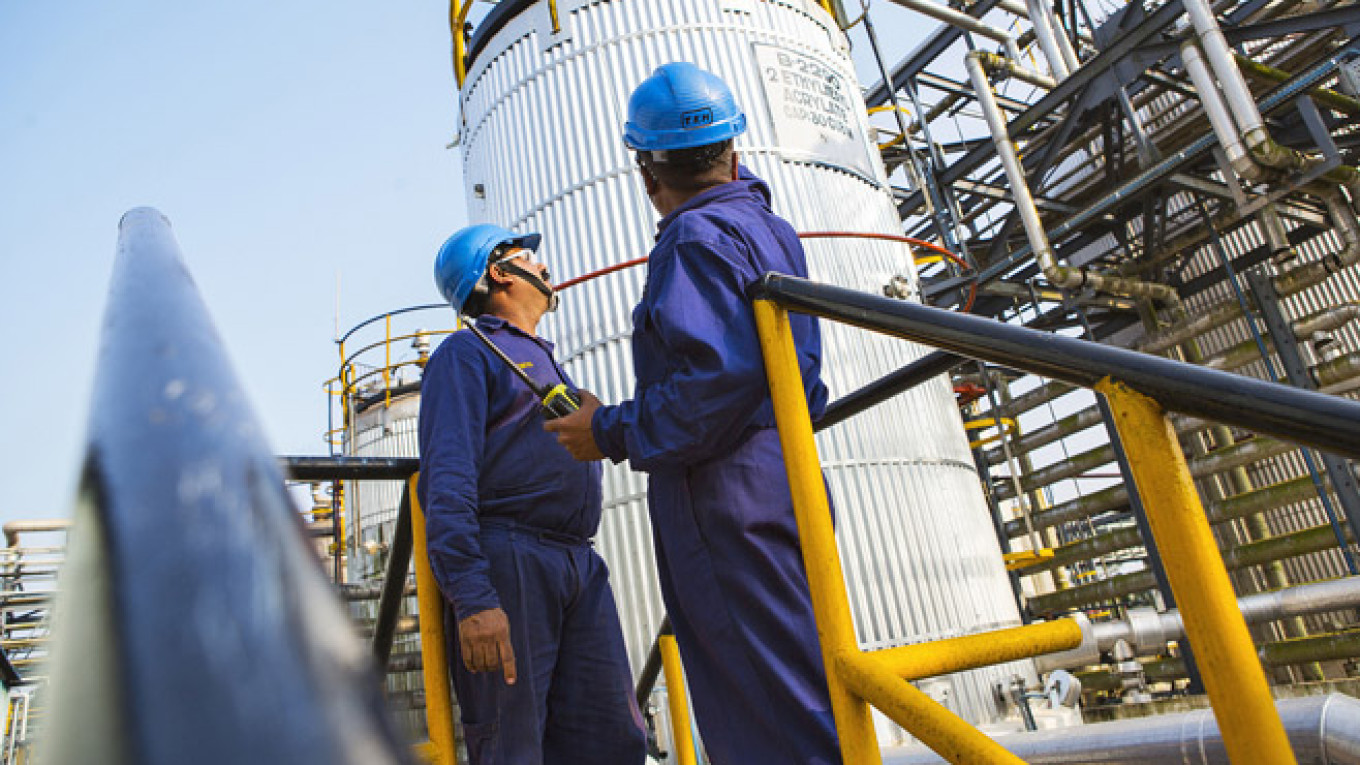FRANKFURT — Gazprom's deal to take over the gas trading arm of Germany's BASF, a leading player in Europe, will be sealed this autumn with no impact expected from sanctions against Russia, said a board member of the BASF unit Wingas.
Ludwig Moehring also reiterated that small declines in Russian gas supply to some European countries this month were within normal variations, which he said was reflected in the way gas prices had failed to rally on them.
Moehring, in charge of sales at Kassel-based importer and trader Wingas, said the Gazprom deal had already been delayed from the summer, but due to ironing out legal details.
"We expect the closing in the autumn and do not fear it will be delayed any further in the [Ukraine] crisis," Moehring said.
The 2012 asset-swap agreement with BASF will give Gazprom access to Wingas, which last year sold 44.3 billion cubic meters across Western Europe — equivalent to nearly half of Germany's total consumption, and 14.1 percent more than 2012.
Once the deal, which also entails Gazprom taking ownership of 6 bcm of BASF's gas storage capacity, is through, Wingas will be moving to new offices in Kassel next year, Moehring said.
Asked about Wingas ability to obtain credit if it was rated as a Gazprom subsidiary, he said this was "being assessed." He added "But we are no longer a billions of euros investor because we no longer have pipeline activities to pay for."
The swap deal entails a huge long-distance pipeline network called Gascade, owned by BASF's oil and gas exploration unit Wintershall, staying with BASF.
Wingas would aim to widen its sales outside Germany, which currently accounts for 75 percent of its total, but would not dramatically change the make-up of its procurement portfolio, that is based on 50 percent of gas from Russia, Moehring said.
It is active in eight Western European countries including Britain, where Gazprom also has representations. Europe's gas production is declining, making greater Russian market share politically controversial but in reality highly likely.
Gazprom has been seeking direct access to lucrative European energy consumers for years rather than relying on middlemen.
Falls in Russian Supply
Reduced natural gas deliveries out of Russia to Europe are within normal fluctuation ranges, Moehring said.
"We also saw lower volumes arrive … but that is no reason for concern and is within normal limits which we also saw in previous years when full capacity was not needed," he said in an interview during a conference on Friday.
"Traders know this and accordingly, prices have not seriously responded, which we see as proof for our assessment," he added.
Russia, which supplies a third of European gas, by some is seen as flexing its muscles as it is locked in a sanctions tit-for-tat with the EU over Ukraine.
Slovakia said on Monday it was getting less gas than requested and Poland said Sunday it had received less on Saturday after the two, as well as Romania and Austria, reported lower than ordered import receipts last week.
But Moehring said it was not unusual to fill stocks in Russia's giant gas pool, and carry out maintenance before the winter season when cold temperatures make this impossible.
Helped by a warm first half of the year, European utilities have injected as much gas into storage this summer as possible in order to prepare for any potential disruption of gas flows from Russia. Supplies this summer have been lower than last year, but significantly higher than two years ago.
Expanding availability at Europe's spot trading hubs has also allowed buying gas at around an estimated 5 to 15 percent discount to volumes in fixed long-term deals, traders have said.
EU gas stocks on Sunday were 90.32 percent full, according to Gas Infrastructure Group Europe, or GIE.
The British October delivery contract at 51.30 pence a therm on Monday was 5 percent below its levels of 54 pence in May. Winter 2014 currently costs 61.3 cents.
A Message from The Moscow Times:
Dear readers,
We are facing unprecedented challenges. Russia's Prosecutor General's Office has designated The Moscow Times as an "undesirable" organization, criminalizing our work and putting our staff at risk of prosecution. This follows our earlier unjust labeling as a "foreign agent."
These actions are direct attempts to silence independent journalism in Russia. The authorities claim our work "discredits the decisions of the Russian leadership." We see things differently: we strive to provide accurate, unbiased reporting on Russia.
We, the journalists of The Moscow Times, refuse to be silenced. But to continue our work, we need your help.
Your support, no matter how small, makes a world of difference. If you can, please support us monthly starting from just $2. It's quick to set up, and every contribution makes a significant impact.
By supporting The Moscow Times, you're defending open, independent journalism in the face of repression. Thank you for standing with us.
Remind me later.


